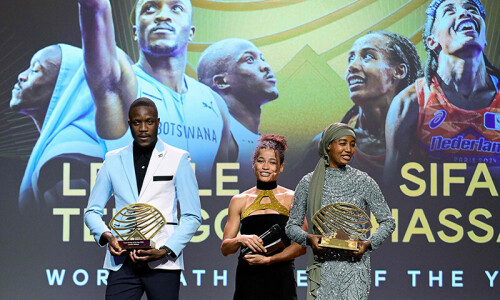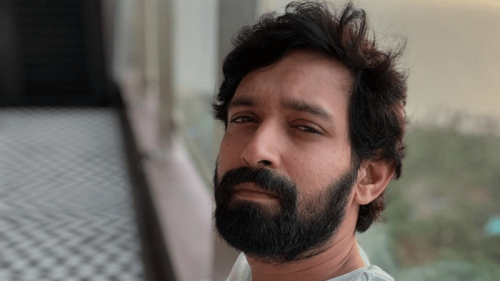LONDON: Alex Ferguson's successor as Manchester United manager will be reminded of the gargantuan size of the task facing him every time he looks across the Old Trafford pitch at the giant stand that bears the venerable Scot's name.
United's 25,500-capacity North Stand was renamed The Sir Alex Ferguson Stand in November 2011.
Facing the dug-outs, it towers over the pitch in the same way that Ferguson's legacy will loom over the club, following the announcement on Wednesday that he is to retire after bestriding English football like a colossus for over 26 years.
Old Trafford was a very different place when Ferguson arrived on November 6, 1986, and United were a very different team.
Fourth from bottom in the old English First Division, they had gone 19 years without winning the league and were forced to toil in obscurity while hated rivals Liverpool swept all before them.
The son of a Glasgow shipbuilder, Ferguson arrived from Aberdeen with a reputation as an iron-fisted disciplinarian, having broken the Old Firm's stranglehold on the Scottish Premier Division.
His crowning glory at Pittodrie was a victory over the mighty Real Madrid in the final of the European Cup Winners' Cup in Gothenburg in 1983, but success at United initially proved elusive.
Ferguson's future at the club was reportedly at stake when United travelled to Nottingham Forest for an FA Cup third-round tie in January 1990, but a Mark Robins goal took the away side through and Ferguson never looked back.
Victory over Crystal Palace in an FA Cup final replay gave the Scot his first trophy at Old Trafford and sparked an unprecedented run of success that has seen him amass a further 37 honours in his time at the club.
A spiky centre-forward during his playing days, which included a two-year stint at Glasgow giants Rangers, stories about Ferguson's fiery temper were legion.
He was once reported to have ejected bemused revellers from a house party held by young United first-teamers Ryan Giggs and Lee Sharpe, while striker Mark Hughes famously likened a dressing-down from the manager to a blast from a “hairdryer”.
Ferguson's intimidating reputation helped him to nurture a precocious group of talented young players who were to form the backbone of his most successful teams.
Giggs, Paul Scholes, David Beckham, Nicky Butt, Gary and Phil Neville emerged from United's youth set-up within years of each other and, dubbed 'Fergie's Fledglings', continued the tradition of rewarding youth instilled at Old Trafford by United's first great Scottish manager, Matt Busby.
United ended a 26-year wait for the league title by triumphing in the inaugural season of the Premier League in 1992-93, before claiming their first ever league and FA Cup Double the following year.
A side of youngsters galvanised around inspirational Frenchman Eric Cantona claimed another Double in 1996, before Ferguson's finest hour arrived in 1999, when United won an unprecedented Treble of league, FA Cup and Champions League honours.
In perhaps their most famous victory, United scored twice in injury time to overcome Bayern Munich 2-1 in Barcelona, prompting Ferguson to succinctly exclaim: “Football, bloody hell!”After the victory, he was honoured with a knighthood by Queen Elizabeth II.
Ferguson had to wait nine years for his next success in Europe's elite competition, following a penalty shootout win over Chelsea in the Moscow rain, and his one regret was that, for all their domestic dominance, United did not enjoy more success on the continental scene.
The 2008 Champions League success was the high watermark of a team that Ferguson assembled after a period of transition in which United were controversially taken over by American businessman Malcolm Glazer.
The move sparked angry protests from fans, at a time when United's domestic dominance had been interrupted by Jose Mourinho's Chelsea, but Ferguson kept his eye on the ball with characteristic single-mindedness.
His thirst for success meant he was always on the look-out for signs of decay and players including Hughes, Beckham, Paul Ince, Jaap Stam, Ruud van Nistelrooy and even inspirational captain Roy Keane were all released with surprising haste.
Only once did Ferguson sell reluctantly, when Portuguese superstar Cristiano Ronaldo left for Real Madrid in 2009, but the United bandwagon rolled on.
Ferguson has been cast as a Machiavellian schemer, setting traps for rival managers to tumble into with carefully directed barbs.
He has had feuds with several opposition coaches, most notably Kevin Keegan, Arsene Wenger and Rafael Benitez, as well as countless run-ins with the football authorities, but his fellow managers often speak of his warmth.
"He is someone all the football managers look up to, they all respect him," said Everton manager David Moyes, who has been touted as a potential successor.
"Even when he's fighting them, he still has the humility to have a drink with them at the end of the game. And he still has the dignity to phone them if they are sacked or out of work. There's a lot of that from his Glasgow roots."
Over the years, Ferguson has adapted to the changing face of modern football, delegating more and more to the coterie of hand-picked coaches around him and trusting in the systems he has put in place.
The club he leaves behind him is unrecognisable.
Old Trafford has almost doubled in size, expanding to a huge, 75,700-capacity super-stadium.
United are no longer a mere football team, but a global brand with a listing on the New York stock exchange, and an estimated value of $3.17 billion (2.42 billion euros).
Many of the millions of fans attracted to United by the club's recent success have only ever known Ferguson as manager, but although many will mourn his departure, the club is now imbued with his will to win to its very core.














































Dear visitor, the comments section is undergoing an overhaul and will return soon.